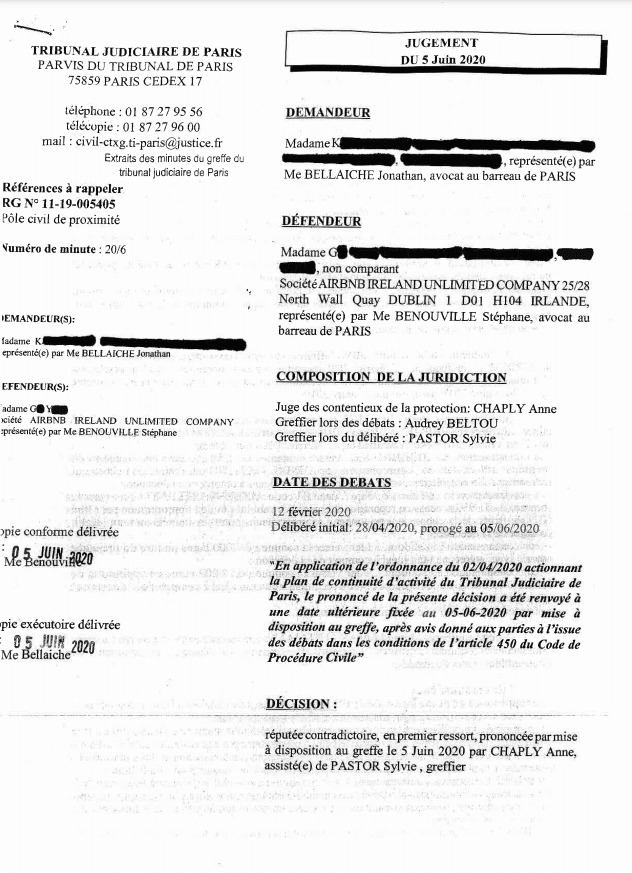

Object of the decision
By a judgment of the Paris Judicial Court dated June 5, 2020, it was ruled that:
“The company AIRBNB IRELAND is a company whose purpose, through a digital platform in the form of the website www.airbnb.fr, which it administers, is to connect people wishing to offer their accommodation for rental, “hosts,” with other people looking for short-term accommodation, “travelers.”
Article 6-I.2, paragraphs 1 and 7 of Law No. 2004-575 of June 21, 2004 on Confidence in the Digital Economy (known as LCEN) provides that “natural or legal persons who provide, even free of charge, for public access through online public communication services, the storage of signals, texts, images, sounds, or messages of any kind provided by recipients of these services may not not be held liable for activities or information stored at the request of a recipient of these services if they were not actually aware of their illegal nature or of the facts and circumstances indicating this illegality, or if, from the moment they became aware of it, they acted promptly to remove the data or make access to it impossible.” (…)7. “The persons mentioned in 1 and 2 are not subject to a general obligation to monitor the information they transmit or store, nor to a general obligation to seek out facts or circumstances revealing illegal activities.”
Conversely, when they play an active role that gives them knowledge or control over the data, these individuals, whether natural or legal, have the status of publisher.
In this case, the AIRBNB platform refers to general terms and conditions that establish rules for use of the site, as well as the contractual relationship between members, notably by requiring them to comply with what AIRBNB designates as its values and expectations, which are mostly reminders of principles, such as non-discrimination, or legislation such as rules relating to dangerous animals or the presence of weapons. However, in addition to this reminder of the rules of good conduct, it provides guidelines to its hosts: be responsive, accept booking requests, avoid cancellations, maintain a good overall rating, and provide basic amenities. Failure to comply with these guidelines may result in content removal and/or penalties.
It is contractually stipulated that the host, by posting content on AIRBNB, agrees to comply with these rules, and that AIRBNB reserves the right to remove any content, in whole or in part, that does not comply with these rules, its general terms and conditions, its community values, and its comment policy, or for any other reason, at its sole discretion. It is also provided that in the event of repeated or particularly serious violations, AIRBNB may suspend or permanently deactivate the account(s) concerned.
AIRBNB therefore has the right to review and remove content for non-compliance with contractual terms, but also for any other reason at its sole discretion.
Conversely, those who adhere closely to these guidelines may be rewarded with the qualification of “superhost.”
AIRBNB denies making a selection of the best hosts, emphasizing the automatic nature of software, which assigns this qualification as soon as the criteria are met. The fact remains that, whether automatic or not, the awarding of this qualification is the result of criteria defined by AIRBNB itself, regularly verified by AIRBNB, and results in the promotion of “superhost” listings as long as their listing is marked with a clearly visible logo and enjoys a prominent position in the list of similar listings. It should be noted that AIRBNB is remunerated by a percentage of the rent collected by the host.
In addition to monitoring host content, AIRBNB has established penalties for members of the hosting contract, including imposing a penalty on guests who leave after the occupancy deadline to compensate for the inconvenience suffered by the host, as well as incidental fees. Similarly, AIRBNB prohibits requesting, making, or accepting a reservation outside of the platform. All of these elements demonstrate the active nature of AIRBNB’s approach in connecting hosts and guests and its involvement in the content posted by hosts on its platform.
It is therefore established that AIRBNB does not simply provide accommodations to the guests who use its site, but rather acts as a publisher.
As such, it is able to verify whether the host has the right to offer a property for rental or not. Section 2.4 of its terms of service confirms this, stating: (…), in the interest of transparency and for fraud prevention purposes, subject to applicable laws, we may, but are not required to, ask Members to provide us with official identification or other information, or to submit to other checks intended to verify the identity and background of Members, consult third-party databases or other sources of information to verify whether Members are listed there, and request reports from service providers and, if we have sufficient information to identify a Member, obtain extracts from criminal or sexual offense (or similar) files from local authorities.
If the host engages in illicit activity through the agency, given its right to review the content of the listings and the activities carried out through the agency as a publisher, it commits a fault by failing to carry out any verification, which contributes to the harm suffered by the owner. Since her liability has been established on this basis, there is no need to examine the other arguments put forward by Ms. KAUFFMANN in support of her request for an order against AIRBNB.
This judgment states that:
- AIRBNB was required to reimburse the owner for the commissions it received from the unauthorized subletting of the property, applying the theory of accession, according to which real estate ownership gives rights to everything it produces. Indeed, since “the commissions received by AIRBNB consist of a percentage of the rent paid by guests for the subletting of the property,” the owner is fully entitled to reimbursement.
- AIRBNB does not simply carry out a web hosting activity: “It is therefore established that AIRBNB does not carry out a simple hosting activity with regard to the guests who use its website, but rather a publishing activity.” The Judicial Court ruled Indeed, the legal consequences were drawn from the fact that: “when they play an active role that gives it knowledge or control over the data, these individuals or legal entities have the status of publisher.”
- AIRBNB must therefore carry out a priori and not a posteriori control of the listings on its site: “As soon as the host engages in an illicit activity through its intermediary, given its right to review the content of the listings and the activities carried out through its intermediary as a publisher, it commits a fault by not refraining from any verification, which contributes to the damage suffered by the owner.”
- AIRBNB is responsible for the acts committed by its users and will be held accountable for all illicit actions committed on its platform.
Thus, it was ordered to pay with provisional execution (immediate execution of the judgment, notwithstanding appeal):
- €51,936.61 in underrent collected due to an abusive sublet
- €1,558.20 in commissions received
- €5,000 in legal fees
For a total award of €58,494.81.
In this case, a landlord had her tenant sublet her property without her permission on the AIRBNB platform for 534 days during 2016 and 2017, allowing her to collect €51,936.61.
This decision is groundbreaking in that it will definitively put an end to the illicit actions committed on the AIRBNB platform, which could harm landlords, platform users, property managers, and the hoteliers I have been defending for many years.
The platform will no longer be profitable to play the illegal game; if it fails to control its actions, it will have to bear the damaging consequences, which amount to colossal amounts. This decision was expected; it was bound to happen.
This decision is the result of a multi-year legal battle aimed at holding the AIRBNB platform accountable by allowing owners to recover illegal rents and now allowing any victim to sue the platform in the event of damages committed through its intermediary.
AIRBNB can no longer claim a content hosting status that was not applicable to it and which allowed it to enrich itself through illicit actions.
The legal framework existed to hold web giants accountable; the justice system, the guarantor of our rule of law, has upheld it.
Olivia Zahedi and Jonathan BELLAICHE

